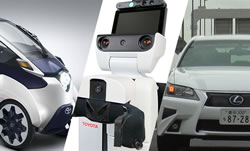Robotics at the Distributed Intelligent Systems Lab at GE Global Research
At GEs Global Research Center, were also looking at the next generation of robotics - drones for aerial-based surveillance and inspection, small scale crawlers for in-situ inspection, and mobile collaborative robotics for things like machine tending in our factories.
Toyota Invests $1 Billion in AI and Robots, Will Open R&D Lab in Silicon Valley
By Erico Guizzo and Evan Ackerman for IEEE Spectrum: Today in Tokyo, Toyota announced that it is investing US $1 billion over the next five years to establish a new R&D arm headquartered in Silicon Valley and focused on artificial intelligence and robotics. The Toyota Research Institute (TRI) plans to hire hundreds of engineers to staff a main facility in Palo Alto, Calif., near Stanford University, and a second facility located near MIT in Cambridge, Mass.
Former DARPA program manager Dr. Gill Pratt, an executive technical advisor at Toyota, was named CEO of TRI, which will begin operations in January. Toyota president Akio Toyoda said in a press conference that the company pursues innovation and new technologies “to make life better for our customers and society as a whole,” adding that he wanted to “work with Gill not just because he’s an amazing researcher and engineer, but because I believe his goals and motivations are the same as ours.” Cont'd...
Festo's R&D Timeline - Part 3 - 2010 & 2011
Part 3 includes more bionic robots like the smartbird and a handler modeled after an elephant trunk.
Festo's R&D Timeline - Part 2 - 2007-2009
More fascinating bionics projects from Festo.
Festo's R&D Timeline - Part 1
Since 2006 Festo has been developing and supporting projects and test objects whose basic technical principles are derived from a wide variety of principles found in nature.
Records 31 to 35 of 35
Featured Product

OnLogic Karbon 430 Fanless Rugged Computer The K430
OnLogic Karbon 430 Fanless Rugged Computer The K430 packs the power and advanced IoT capabilities of modern Intel processing into a low profile, highly customizable, rugged fanless system built for the challenges of the IoT Edge. Internal components are protected from dust, debris, chemicals, and moisture thanks to fanless and ventless cooling. The Karbon 430 features an operating temperature range of -40° to 70°C, 9~48 V power input, and zero moving parts, all of which help to ensure a long system lifespan.





